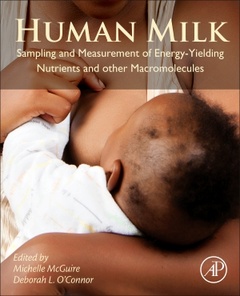Description
Human Milk
Sampling and Measurement of Energy-Yielding Nutrients and Other Macromolecules
Coordinators: McGuire Michelle, O'Connor Deborah L.
Language: English
Subjects for Human Milk:
Keywords
?Adiponectin; Alcohol; Analytical methods; Bioactive peptides; Bioavailability; Breast milk; Breastfeeding; Chemokines; Cytokines; Desmosterol; Energy; Ethanol; Exosomes; Extracellular vesicles; Fat; Fatty acids; GD3; GM3; Gestation; Growth factors; Health benefits; Hormones; Human; Human milk; Human milk production; Immune factors; Immunoglobulins; Infant; Infant growth; Infant milk intake; Lactation; Lactose; Lipids; Macronutrient; Macronutrients; Mammary gland; Metabolizable; MicroRNAs; Milk; Milk fat globule membrane lipids; Milk volume; Nonprotein nitrogen; Nutrition; Oligosaccharides; Peptide hormones; Phenotypes; Phosphatidylcholine; Phosphatidylethanolamine; Phosphatidylinositol; Phosphatidylserine; Polyunsaturated FA; Protein; Proteins; RNA; Research methods; Specimen handling methods; Sphingomyelin; Urea; Variability factors
422 p. · 15x22.8 cm · Paperback
Description
/li>Contents
/li>Readership
/li>Biography
/li>Comment
/li>
Human Milk: Sampling and Measurement of Energy-Yielding Nutrients and Other Macromolecules presents comprehensive, rigorous, state-of-the-science information on the origins, analysis, concentrations and variation in energy-yielding nutrients and other macromolecules present in human milk. The book includes information on how best to collect and store milk for determining concentrations of these important milk constituents and considers how to conduct milk composition analysis in research, clinical and resource-poor settings. Written by a group of international experts who are actively conducting research related to human milk macronutrients, each chapter also provides cutting-edge rationale for what research is still needed in this evolving field.
In addition, the book also outlines challenges and opportunities faced by clinicians, industry leaders and regulators interested in adding these components to infant foods, human milk nutrient fortifier and formula.
Part I The Energy-Yielding Nutrients 1. Proteins and Amino Acids in Human Milk - An Overview 2. Human Milk Lipids – An Overview 3. Regulation of Fatty Acids in Human Milk 4. Simple and Complex Carbohydrates in Human Milk 5. Alcohol in Human Milk 6. Assessing and Estimating Caloric Content of Human Milk
Part II Biologically Active Macromolecules 7. Hormones and other Biologically Active Proteins in Human Milk 8. Immune Factors in Human Milk 9. Nitrate and other Forms of Nonprotein Nitrogen in Human Milk 10. MicroRNAs and Stem Cells in Human Milk 11. Milk Fat Globule Membrane Proteins in Human Milk 12. Sphingolipids, Cholesterol, and Other Minor Lipids in Human Milk
Part III Methodologic Issues and Summary 13. Collection and Storage of Milk for Macronutrient and Macromolecule Analysis – An Overview 14. Measurement of Human Milk Production and Milk Intake 15. Rapid Measurement of Energy and Macronutrients in the Clinical Setting 16. Macronutrients and Macromolecules in Human Milk – Summary and Next Steps
researchers, public health experts, and industry personnel interested in human milk, maternal/infant nutrition, and health
Dr. O’Connor received her M.S. and PhD from the University of Illinois. She received her clinical training at Kingston General Hospital in Ontario, Canada. Dr. O’Connor is currently a professor in the Department of Nutritional Sciences, Faculty of Medicine at the University of T
- Presents analytical issues and challenges
- Contains information regarding optimal milk collection and storage procedures for each milk component
- Uses a systematic treatment of common factors relating to milk composition variation (e.g., time postpartum, maternal diet)
- Provides a brief summary at the end of each chapter
- Reviews the literature related to history/discovery, analysis, isoforms, origins/transport, variability, metabolism and research gaps




